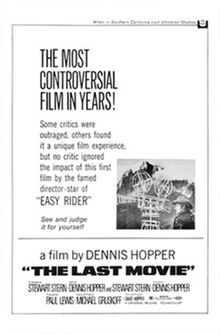The Last Movie
| The Last Movie | |
|---|---|
 |
|
| Directed by | Dennis Hopper |
| Produced by | Paul Lewis |
| Screenplay by | Stewart Stern |
| Story by | Dennis Hopper Stewart Stern |
| Starring | Dennis Hopper Stella Garcia Don Gordon Julie Adams Sylvia Miles Peter Fonda Henry Jaglom Michelle Phillips Kris Kristofferson Russ Tamblyn Tomas Milian |
| Music by |
Severn Darden Chabuca Granda Kris Kristofferson John Buck Wilkin |
| Cinematography | László Kovács |
| Edited by | Dennis Hopper David Berlatsky Antranig Mahakian |
|
Production
company |
Alta-Light
|
| Distributed by | Universal Pictures |
|
Release date
|
|
|
Running time
|
108 minutes |
| Country | United States |
| Language | English |
| Budget | $1 million |
The Last Movie is a 1971 drama film from Universal Pictures. It was written by Stewart Stern and directed by Dennis Hopper, who also played a horse wrangler named after the state of Kansas. It also starred Peter Fonda, Henry Jaglom and Michelle Phillips. Production of the movie, which cost $1 million, took place in the film's major setting, Peru.
Kansas (Hopper) is a stunt coordinator in charge of horses on a western being shot in a small Peruvian village. Following a tragic incident on the set where an actor is killed in a stunt, Kansas decides to quit the movie business and stay in Peru with a local woman. Kansas thinks he has found paradise, but is soon called in to help in a bizarre incident: the Peruvian natives are "filming" their own movie with "cameras" made of sticks, and acting out real western movie violence, as they don't understand movie fakery. The film touches on the ideas of fiction versus reality, especially in regards to cinema. The movie is presented in a way that challenges the viewer's traditional cinematic understanding of storytelling, by presenting the story in a non-chronological fashion, and by including several devices typically only seen behind the scenes of filmmaking (rough edits and "scene missing" cards), and the use of jarring jump cuts.
The Last Movie was a long-time pet project of Hopper and writer Stewart Stern. (Stern had written Rebel Without a Cause, in which Hopper played a small role.) After developing the script in the early 1960s, Hopper tried for years to secure financing for the film, intending it to be his directorial debut. Due to the artistically challenging nature of the film, no studios were interested until Hopper's actual first film as a director, Easy Rider, became a massive hit in 1969.
Given free rein on a budget of $1 million from Universal, Hopper spent much of 1970 in Peru shooting the film under the working title Chinchero, bringing many of his actor and musician friends to Peru, including singer Kris Kristofferson and director Samuel Fuller. With hours and hours of footage, Hopper holed up in his home editing studio in Taos, New Mexico, but failed to deliver a cut by the end of 1970. Hopper was in a period of severe alcohol and drug abuse (as shown in an extremely rare and barely released documentary called The American Dreamer, which was directed by Lawrence Schiller), but managed to put together a fairly straightforward cut in terms of conventional storytelling. He was mocked over it by his friend, cult director Alejandro Jodorowsky, who urged him to edit the film unconventionally and attempt to break new cinematic ground, which caused Hopper to destroy that edit and craft the more disjointed narrative that is known today, and he finally completed that final edit in the spring of 1971.
...
Wikipedia
